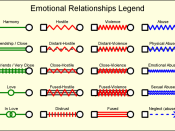Premise 1: men in the army are able to live without emotional nurturance from women Premise 2: men in jail are able to live without emotional nurturance from women Premise 3: many men who do receive emotional nurturance from women are still not emotionally stable PP1: there large numbers of men who are in heterosexual relationships who become alcoholics PP2: there are large numbers of men in heterosexual relationships that battle drug addiction PP3: there are large numbers of men in heterosexual relationships that commit suicide Conclusion: Men do not receive significant benefits from the emotional nurturance of women.
The author's main claim in this article is that emotional nurturance from women to men is damaging to women. It is widespread belief that emotional nurturance is part of the womanly spirit, seen as a very natural and essential occurrence. It is also believed that men, unable to be in touch with their emotions as well as women, need this emotional support from their female counterparts.
In this article however, she claims that men in fact can survive without this emotional nurturance but that women feel it is their duty to give this support. Bartky believes that this unequal distribution of emotional nurturance is damaging to women's self- esteem, to their ability to acknowledge their own values, and that it reinforces male supremacy. Our society is structured to believe that this nurturance given by women is essential to a healthy, loving and balanced man. This idea has been present in society for centuries, being used as a way to keep women in their place, to give them a false sense of control. Women believe that their nurturance is of actual benefit to men. It is, but in a way that is damaging to the women themselves. While women believe their nurturance is essential to their man's well being, it is actually a reinforcement of the power of men and their control over women.
Premise 1 and Premise 2 of this article may be criticized so as to discredit the conclusion drawn from the arguments presented. Many men that have been enrolled in the army or that have been in jail for some time suffer severe emotional instability. It can be argued that this instability may come in part from a lack of nurturance from females that were once present on a daily basis in their lives. Although harsh conditions and confinement in a small space could contribute to these mental states, the fact that these men receive no affection or nurturance of any kind may play a key role in their mental disabilities.
The response from this criticism comes directly from Bartky's article, where she supports Lillian Rubin's claim that men develop relationships with other men when placed in these conditions that provide them with a source of emotional support. These relationships, while not necessarily homosexual relationships, provide men with a type of human bond that can greatly improve their outlook and quality of life. It is important to be aware of the fact that it is not only men who are in the army or in jail who suffer from mental instabilities. While these cases may be publicized more in the media, cases of married men acting rashly or suffering from mental disabilities are just as common, as shown in my Premise 3. Because of the way that our society is structured, the fact that a suffering male received nurturance is never publicized, but the fact that another male may have not received this is often blamed as the cause of his actions. In other words, women are not recognized for the emotional support they provide but are criticized once this support is no longer available for men.





